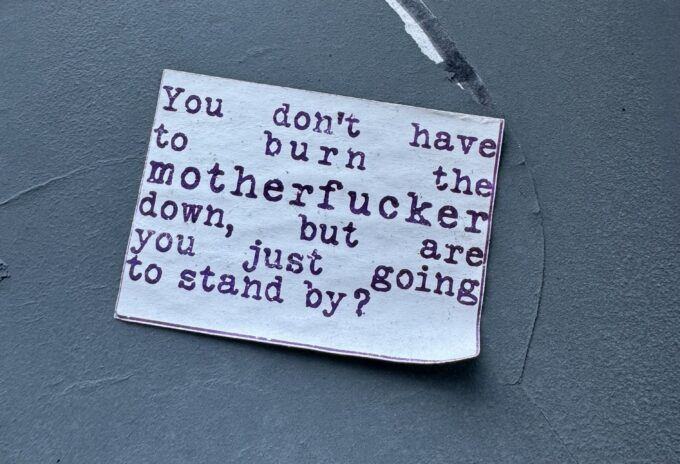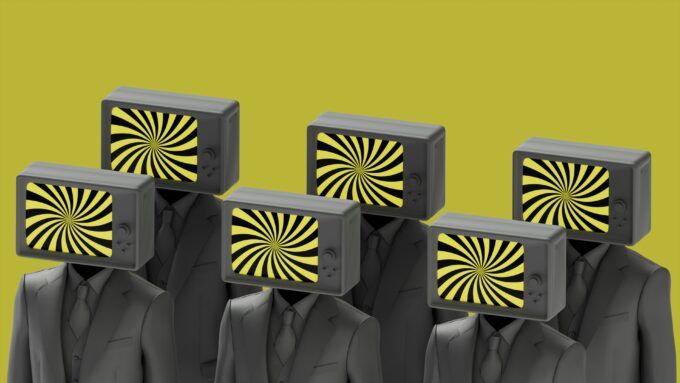
Published on http://bad.eserver.org/
“I set out to grasp the mechanisms of the effective exercise of power; and I do this because those who are inserted in these relations of power, who are implicated therein, may, through their actions, their resistance, and their rebellion, escape them, transform them—in short, no longer submit to them.”
Michel Foucault, Dits et Ecrits
I’ve been rattled by a video sent to me wherein, according to the Detroit Free Press “a noted professor at a large Midwestern university” was videod as he railed against ” Republicans and “closet racists in class last week.” The video found its way to You Tube and, I suppose, like all viruses will run its course and then fade from memory. The words, however, of a university spokesman in regard to “a free exchange of ideas” going on in a classroom brought back to me some words by Foucault, quoted above, regarding power’s reach, words I extended to the classroom. In Discipline & Punish, Foucault himself had made a frightening comparison when he asked “Is it surprising that prisons resemble factories, schools, barracks, hospitals, which all resemble prisons?”
On the most obvious level, one that angry responses to this professor’s rant point out in referring to his abuse of power, students are a captured audience, wary of angering those who wield the power of the grade, now more than ever a linchpin in our zero sum game of Winners and Losers. But I’m also mindful that another sort of power, one not wielded by the professor but already instilled in the societal surround is at play here, unrecognized and therefore unindicted.
This sort of power invades the classroom under the disguise of phrases such as “free exchange of ideas,” a phrase which is now as faddish a credo as “free to choose” but like that phrase conceals dark complexities which can be disturbingly linked to our present asymmetrical arrangement of power. That arrangement, most certainly the product of our zero sum competitive Monopoly-like game of Winners and Losers, infects places, like neighborhoods and classrooms, and practices, like politics. But minds also, mind which are already subject, not simply to the Wielder of the Grade, but to the exercise of unequal power that aligns students with the goals and objectives, ejections and destructions which support the preservation of that power.
No manner of “free exchange of ideas” can go on given this situation because already existing priorities re-arrange all critique into what is palatable to those already existing priorities. If that initial defense is overcome somehow, one is yet in a classroom in which a clash of ideas and arguments has become no more than a clash of opinions, a clash without resolution as each disputant retreats to the sanctity of “my own opinion.” The task of reaching young minds already “friending” and “unfriending” words in line with powerful overriding societal priorities is a formidable task but one not deterred by disingenuous notions of the “free exchange of ideas.” Such a task should not be deterred also by the frustration of discovering that all attempts at “unpackaging” those priorities lead to the dead end of a student’s personal opinion.
Pre-existing conditions of asymmetrical power make a farce of “free exchange” as does a belief in the inviolability of personal opinion. Both conditions preempt any attempt in a classroom to dismantle asymmetrical power. A society in which power is asymmetrically arranged cannot be exposed or dismantled by the pretenses of an objective, disinterested and balanced approach. Such an approach confirms the illegitimacy of a corrupted status quo. Unfortunately, it is an approach that lingers on and comes tied to the equally problematic pretense of a “free exchange of ideas.”
Why would we not expect that what we now mean by the “free exchange of ideas” is a “free exchange of opinions,” no one’s opinion overruling another? We are in a “post truth” era, which means that the age of absolute and universal judgments, judgments made from outside the furor of clashing subjectivities, is over. None on either side of an issue hold their truths to be merely stories or that their judgments should not be universal. No one, in fact, who knows in their heart what was true, or knows by rigorous rational or empirical methods what is true, believes we live in a “post-truth” age. Nonetheless, a mere survey of the last half century would show us that no universally accepted universal rule of truth judgment has been at play in the world, Humankind’s or any Celestial Entity’s. To say we are in a “post-truth” age is merely to affirm that truth is a transactional arrangement of varying longevity. And like all transactional arrangements, it is arranged by “the effective exercise of power.”
The troublesome aspect of opinions is that although they seem personally inspired with each person creating for themselves a response to conditions they observe, our opinions are more certainly shaped by the surrounding conditions than our own original genius. Surrounding conditions, the social and cultural milieu, the economic and political arrangements are the waters within which our minds swim. And in asymmetrical power distributions, you can expect that our opinions are not being shaped to disturb those distributions.
How do we re-orient such an arrangement? It seems that when our opinions are serving a foundational inequality, we should not be trumpeting them but rather investigation them. We need to question the unquestioned mantras of the day, especially the illusion that we personally design the world the way we personally design a Facebook page or a website, that all things personal exceed and are opposed to all things societal.
The media is loathe to point out in the dramatic way it deserves that our democracy has turned into a plutocracy and I suppose the reason for this has much to do with the media’s ties to the top 20%. Americans remain unconcerned with this slow but progressing alteration of democracy to plutocracy because the story gets lost amid other stories, a tweet amid a never ending downpour of tweets. It does seem as if Pandora’s Box has been opened when it comes to story making, what some call a “democratization” of journalism, a freer, in short, exchange of ideas because everyone is now involved, free to comment, to like, to blog, to opine. Surely it is as possible to impede ideas and the ability to interpret them by chaotic downpour as by Gestapo-like censorship? Ironically, asymmetric power now oversees this confusion of public discourse while privatizing everything else with the word “public” attached to it.
In the absence of any Solomon of judgment or Oracle of Truth, or what scientists call an external point of reference to which all claims can be adjudicated, what we have now is a cacophony of voices. We have a whirlwind of opinions that either blow heatedly and often viciously but always emptily in cyberspace, or they take the shape that an asymmetrical power gives them by virtue of owning the mechanisms of influence, i.e. volume, spectacle and repetition.
Again, how to challenge such an arrangement? One of the ways that this is done is in the classroom, which is a societal space but not in the sense that its mission is to inculcate the priorities of any particular society. Whether a society is enjoying good or bad economic times, the classroom mission is to impart the highest level of societal awareness which itself depends upon an understanding of the achievements of the past and the development of a critical awareness grounded in skepticism.
Our classrooms have travelled far from this view because our U.S. society has travelled far from this view. In a society in which power is asymmetrically arranged any level of education must serve the priorities which transfer all social and public enterprise to the personal and private level that is itself governed by market principles. There is no freedom in this because there is no equality in the powers of representation, although a sense of personal and individual freedom as well as a sense of self-empowerment prevails. If we could see through such illusions, we could see the dominance of a free market economic rule leading to a severe asymmetry in wealth and power. Such rule has self-protectively fabricated illusions of a personal freedom although such freedom, upon any examination, has been curtailed severely. This rule makes only one demand of the classroom: that it lead the young to accept that rule and detour them from any opposition.
The way you lead students in this fashion is ensuring that a balanced neutrality oversees any discussion. Students are, in this scenario, like jurors listening to a case as presented. The professor is a judge who makes sure that the rules of the court, in this case, objective balancing of all views, are upheld. But teaching is not anything like this; the role is not passive nor is there any pretense to a balanced treatment when every aspect of the enterprise, including the already existing dispositions of the students as well as the societal forces that dominate their thinking, are far from balanced.
The easy course is not to trouble those already existing preferences and prejudices. The easy course is to stay clear of the credos, illusions and presumptions that block any development of thought. The easy course is to stay clear of taking on the already existing distortions of thought ensuing from a outside-the-classroom surround imbalanced and distorted. The easy course is to avoid any disruption of resident student values because your dissidence antagonizes students and creates a hostile audience. The easy course is to make sure that if a hidden camera is on you that you say nothing that will lead to the public humiliation of a YouTube video. The easy course is not to unravel opinions and expose the subtle machinations of power seeking to maintain its position as the status quo or, philosophically, a true expression of “things as they are” when “things as they are” are only what a plutocracy wants them to be.
There is now a great deal more pressure to take this easy course when every student has some hand held device to broadcast your dissidence globally.
In an already dangerously deluded and divided society, no one can go on as if an enormous power disparity can be amended by going on as if such a disparity did not exist. Nevertheless, an enlightened, objective disinterestedness is rolled out to protect such a disparity from the rigorous critique needed. Any attempt to correct such an imbalance is greeted as extreme, as radical. However, the nature of inquiry is not to presuppose or impose a balance that does not exist but to expose the deceit, illusions, and blindness of what does exist.
The university classroom has been, whether frequently or not, a place where young minds can be challenged. It is difficult now to find any place where such challenges are made. You would have to range beyond the power of money and the political power it achieves and is able to hold on to in a plutocracy. Print newspapers go extinct and head online where they join a faceless horde of “citizen journalists” and thereby, in the chaotic, unsearchable mix, all distinction is lost, all solidarity dissolves into personal tweets and photos on Facebook. Popular culture takes its shots but market values quickly commercialize such threats. Art, however, high and serious or low and popular, has historically found a way to fly by all nets. But it is the classroom in which the challenge to a resident order, especially one so askew as our own, is launched. There is some hope in the classroom that minds exploited by an exploiting culture can be re-directed. There’s a chance that the baggage piled on students by a society that already has them bending to the mantra of “Let Markets Rule!” can be exposed, like the Wizard of Oz behind a curtain, as impostures and fabrications serving the very narrow ends of a very few.
Just as Dietrich Bonhoeffer in a classroom at the University of Berlin was seen as an enemy of the state, a state ruled by the Third Reich, we now have teachers in classrooms whose words oppose the injustices of our own plutocracy. I hesitate to mention Bonhoeffer and the treatment of his dissidence by the Third Reich because the victims of our market rule cannot be so imagined, if imagined at all. But the supremacy of our market rule Prime Directive has made not only our egalitarian democracy a victim but the health and sustainability of planet and people, except a wealth minority. One wonders as to what sort of “free exchange of ideas” can go on when progress and growth are reported by and experienced by a top 20% who also steadily work on 80% of the population to assume responsibility for their own misery? This is perhaps the most mind-boggling of all our new “New Normals.”
There is a very hard course to take in the classroom now, especially so because what goes on in the classroom is a battle for young minds already driven to commit, for reasons of economic survival, to values that do not go beyond profit to shareholders. What is now required in the classroom is almost a “Shock & Awe” campaign, a sudden shock of recognition that gross inequities in a society cannot and will not foster an open and free exchange of ideas.
Because the “free and open range” of a cyberspace twittering is replaced in the classroom by the simple privileging of the instructor’s “bully pulpit,” plutocratic power cannot drown out classroom challenges with a hail storm of personal opinion. What plutocracy does is target all classroom challenges as a danger to itself in the same axiomatic way that globalized techno-capitalism axiomatically responds to governmental regulations and entitlements that it sees as a danger to itself. We are now witnessing a powerful lobbyist effort to privatize public education not only for reasons of profit but also to place teacher and classroom in a competitive customer/business relationship, thus explicitly confining “free exchange of ideas” to the dimensions of market rule. Unfortunately then, parents, now customers, already committed to the values that asymmetric power has arranged will shop for the classrooms that support those values. Possibilities of expressing challenges of such values to the young thereby decrease.
As Bonhoeffer discovered, it is difficult and dangerous to expose the ills of a society from within the institutions of that society but some take that hard course and do it and in doing so re-acquaint us with what a “free exchange of ideas” could mean.














One Comment
google plus android app
I’m gone to inform my little brother, that he
should also pay a quick visit this webpage on regular basis to obtain updated from most up-to-date reports.